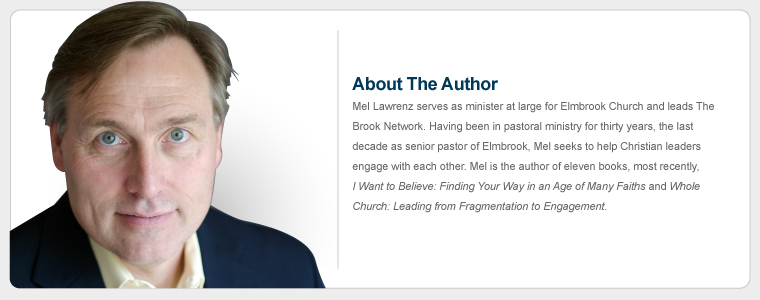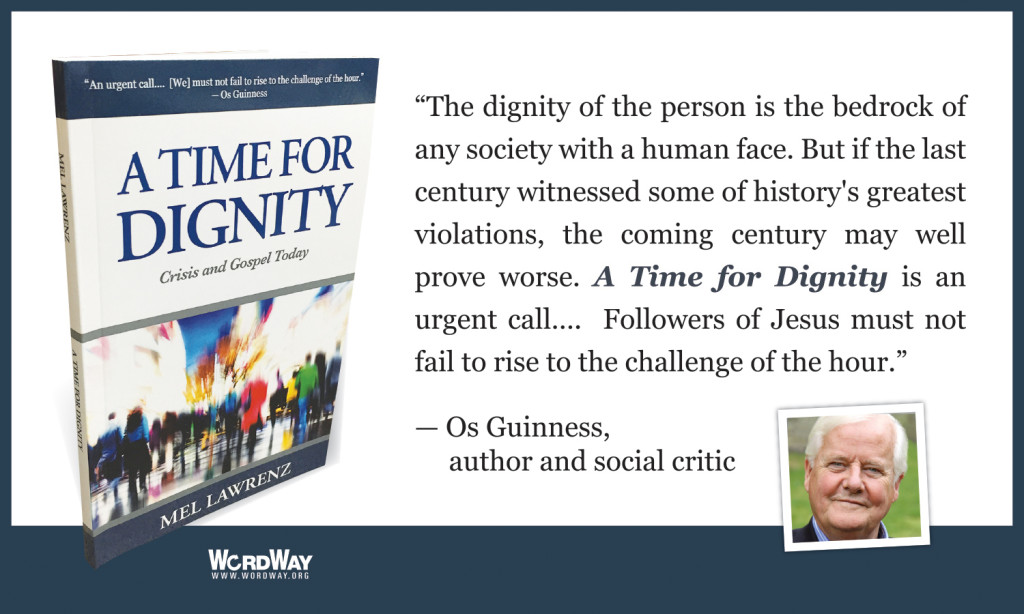  | Having trouble seeing this email? View it online. |
 | |
We Are in This TogetherDr. Mel Lawrenz is Minister at Large for Elmbrook Church and Director of The Brook Network. His writings may be found at WordWay. ____________ Letâs imagine ourselves as believers in first century Thessalonica, Greece, the day that a letter was received by the leaders of the churchâa letter from the founder of the church, the apostle Paul. You are one of the elders of the church, and you read Paulâs instruction and admonitions with a sense of urgency and care. There is no âNew Testamentâ as the 27 books we know today. The Gospels have not been written yet. Not Romans or Hebrews or Revelation. You and the rest of the leaders in Thessalonica are going on the gradually unfolding apostolic teaching which formed the foundation of the early church (Ephesians 2:20). You listen carefully to the words, read out loud by one of the other leaders.
And then an important process unfolds. You and the other leaders of the church discuss what you have just heard from Paul. You go over what he has written about suffering, and sanctification, and salvation. You ask for someone to re-read the bit about the coming of Christ. Someone suggests the entire letter be re-read again, from the beginning. You discuss Paulâs points. Sometimes there is a little disagreement over something specific Paul said. You talk about why he wanted this church, the believers in Thessalonica, to understand these specific things. You discuss how to apply the meaning of Paulâs words. One leader suggests an application, and someone else enthusiastically suggests another application. After a couple of hours of discussion you realize that this short letter, this authoritative word from Godâs chosen apostle, is going to reverberate in your community for a long time to come. Paul has addressed some controversies, reinforced some teachings, and pioneered new ideas. You come to understand this letter to the Christian community in your city of Thessalonica because you have read it together, discussed it together, and applied it together. So here we are in the 21st century reading the same words, attempting to get the meaning and apply it responsibly and fully. We do so, not in isolation, but with other believers. We get the gold from the goldmine of Scripture not by prospecting in isolation, but as we work together. Bible study is a community effort. For some people, that impulse comes naturally. They donât want to be isolated, and they read Scripture and immediately want to compare reactions and interpretations with other people. Some people, however, so value that holy time when they privately read and explore Scripture, asking the Holy Spirit for illumination, enthused with new discoveries, slain by confrontation, inspired with new visions of God, that they almost want to avoid discussing the Bible with other people. They may believe that private interpretations of Scripture are sacrosanct, and that comparing notes with others takes something away from their genuine interaction with God. We need to be balanced here. It is true that the truth of God in Scripture is available and accessible to any individual believer. No one stands between us and God. But on the other hand, we are in this together. God gives different insights to different peopleânot splitting the meaning of his word, but revealing different facets of it. Thatâs the way Scripture functioned in ancient times, and it is the way we should study it today. So what does that look like today? 1. We should all find fine Bible teachers and benefit from their instruction. That will include local pastors, but also the radio and the internet. We have a huge advantage today in being able to subscribe to podcasts or log into sermons preached thousands of miles away. It is better to listen to multiple teachers rather than just one. We are disciples of only one figureâJesus the Christânot the pastor with the largest podcast. 2. We should read widely, but with discernment. You can google any Bible question you have and get hundreds of links, but much of what Google leads you to is junk. Know the writers you followâtheir organizations, their publishers, their associations. 3. We should view our use of commentaries and other tools produced by reliable scholars as a function of the wider Christian community. 4. We should study Scripture with other believers in our communities. It is exciting to sit in a circle and work through Bible study when it is led by someone who understands Scripture and proper methods of interpretation. It is powerful when members of the group contribute their observations, ask their questions, explore their thoughts about application. It is important for the leader to be well prepared, and present enough for a rational discussion to take place, and then to guide the group, drawing people out. Group Bible study should not be passive listening, and it should not be a pooling of ignorance. Group Bible study works best when it unfolds over a long period of time. We are in this together, just like the early communities of believers were. The beauty of it is that we get to know God better as we get to know each other better. The truth of Scripture is a living, dynamic force in our lives. On our best days we see that power in usâand we see it in each other. | |
| | Resources
|
 | |
Subscription InfoThis email was sent to newsletter@newslettercollector.com by Bible Gateway, 3900 Sparks Drive SE, Grand Rapids, MI 49546 USA by Bible Gateway, in partnership with The Brook Network. You received this newsletter because you signed for it on BibleGateway.com or one of its associated websites. Should you wish to unsubscribe for any reason, please click on the "Manage Subscriptions" link below. Clicking "One-click unsubscribe" will permanently unsubscribe you from all of our newsletters. If you encounter any problems while unsubscribing or have a different question, please visit our feedback page to let us know. | |
  | |


